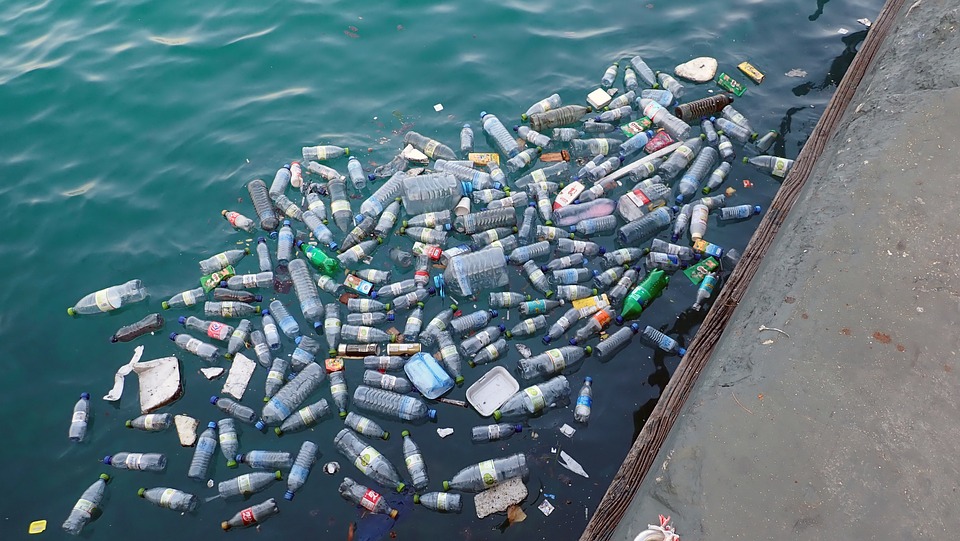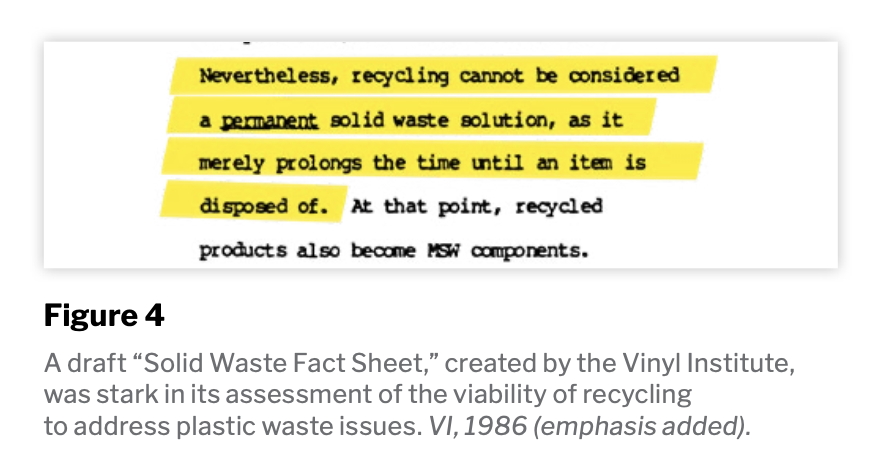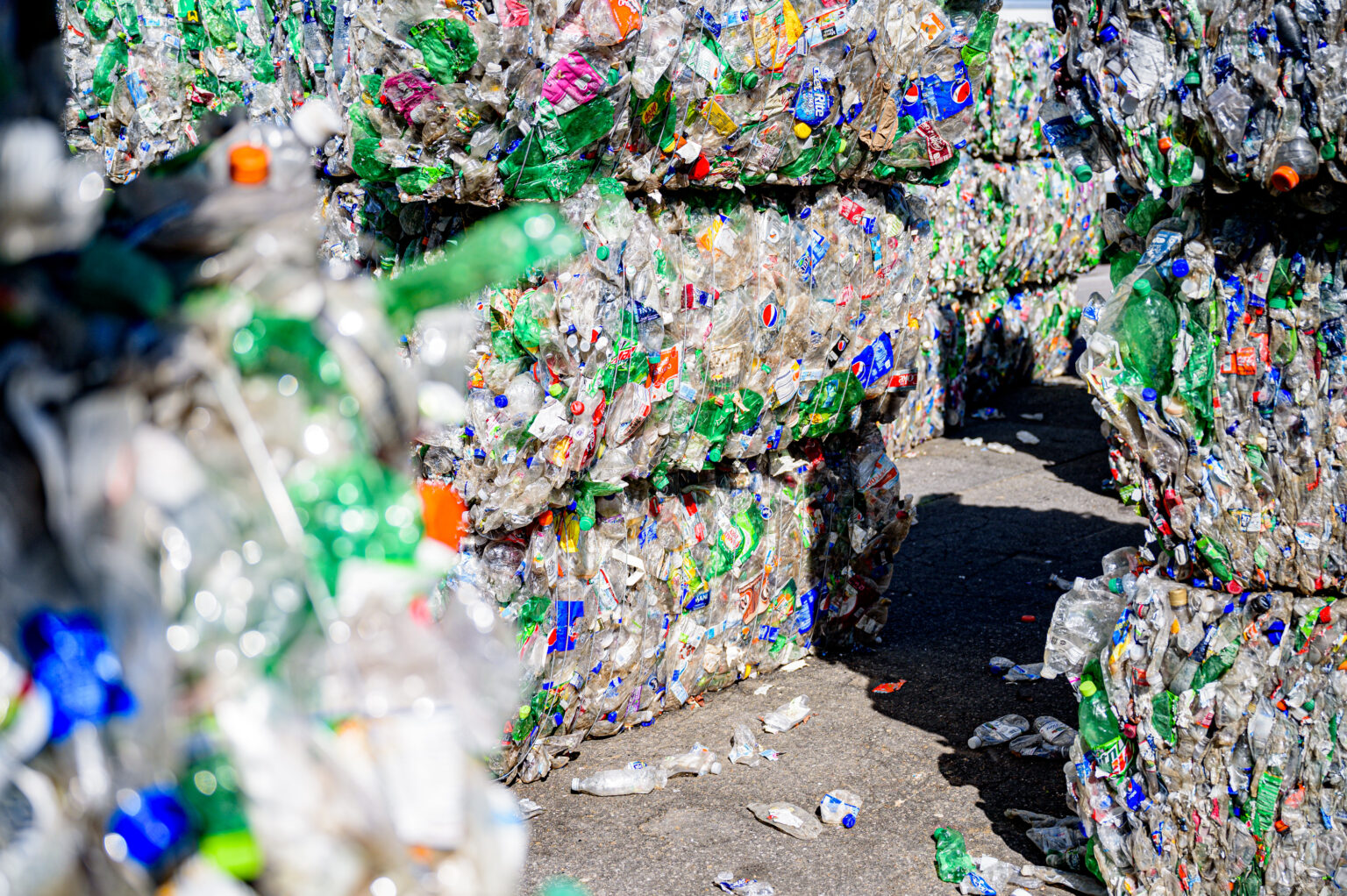An explosive new report finds that the plastics industry has misled the public for decades about the viability of recycling plastic, promoting reuse despite the fact that mechanical recycling was not feasible – perpetuating the plastic waste crisis the world faces today.
“The plastics industry has ‘sold’ plastic recycling to the American public to sell plastic,” according to the report by the Center for Climate Integrity (CCI), a nonprofit organization that advocates for legal action to hold the fossil fuel industry accountable. In a statement, CCI claims the study, called “The Fraud of Plastic Recycling: How Big Oil and the plastics industry deceived the public for decades and caused the plastic waste crisis,” includes “evidence that could provide the foundation for legal efforts to hold fossil fuel and other petrochemical companies accountable for their lies and deception.”
Petrochemical companies and the plastics industry have known of the technical and economic limitations that make plastics unrecyclable for more than half a century, and “have failed to overcome them,” the report states. “Despite this knowledge, the plastics industry has continued to increase plastic production, while carrying out a well-coordinated campaign to deceive consumers, policymakers, and regulators about plastic recycling.”
“This evidence shows that many of the same fossil fuel companies that knew and lied for decades about how their products cause climate change have also known and lied to the public about plastic recycling,” Richard Wiles, CCI’s president, said in a press release. “The oil industry’s lies are at the heart of the two most catastrophic pollution crises in human history.”
Plastics manufacturers and industry groups, including some of the largest oil and gas companies in the world, have spent more than 50 years funding and pushing plastics recycling in order to stave off regulatory action – all while knowing that only a small fraction of plastic waste could ever be recycled.

Beginning as early as the 1950s, petrochemical manufacturers began investing heavily in single-use plastics because disposability helped perpetuate demand for plastic production. Over the following decades, according to CCI, the industry began responding to public concern about plastic waste with a series of head-fakes designed to lessen public pressure while preserving profits.
One of the industry’s early “solutions” to plastic waste was simply to collect it in landfills. Plastics “don’t biodegrade,” promised the head of the Society of the Plastics Industry (SPI), an industry group, in the 1970s. As a result, waste could “just sit there.” Problem solved.
If landfills didn’t placate the public, there was always incineration: “Recycle plastic packaging? An excellent idea,” said one executive of the American Can Company in 1971. “But let’s recycle it into energy” by incinerating it.
When neither landfilling nor so-called “waste-to-energy” incineration succeeded in satisfying consumers or policymakers, the industry went all in on recycling.
In the early 1980s, SPI created the Plastics Recycling Foundation (PRF), an industry group whose members included Exxon Chemical, to push the narrative that petrochemical manufacturers were solving the challenge of plastic waste themselves – no need for lawmakers or regulators to intervene.
Yet industry scientists had known for decades that most plastics could not be recycled and, moreover, that it was more cost effective to produce new plastic than to attempt to reuse the old.
“Recycling cannot be considered a permanent solid waste solution, as it merely prolongs the time until an item is disposed of,” concluded a draft fact sheet from the Vinyl Institute, another industry group, in 1986. A few years later, the group’s founding director acknowledged at a conference that “recycling cannot go on indefinitely, and does not solve the solid waste problem.”
But public policy was a far greater threat to industry profits than the fact that scientists still hadn’t figured out how to actually recycle most plastic waste.
“No doubt about it, legislation is the single most important reason why we are looking at recycling,” said PRF executive director (and DuPont marketing head) Wayne Pearson in 1988.

By the early 1990s, the CCI report finds, “the industry knew that mechanical recycling was not a viable solution – yet renewed concerns about plastic waste and its impact on the environment meant they needed the public to believe recycling could address their concerns.”
The number of industry-backed coalitions, research entities, trade associations, and front groups grew rapidly. In 1988, the SPI introduced the now-ubiquitous labeling system, with numbers “surrounded by a triangle of ‘chasing arrows,’ the widely recognized symbol for recycling,” ostensibly to help consumers sort plastics into different groups – even though regulators and recycling bodies “did not need, and in some cases actively opposed,” this system, according to CCI.
The industry’s support for legislation requiring numbering was an explicit effort “to prevent bans” on plastic use, as one trade association put it.
Hiding the truth about the failure of recycling to ease pollution has created the plastic waste crisis now clogging waterways around the world. Credit: Public Domain
“Big Oil and the plastics industry’s decades-long campaign to deceive the public about plastic recycling has likely violated laws designed to protect consumers and the public from corporate misconduct and pollution,” said Alyssa Johl, CCI’s vice president of legal and general counsel, in a press release.
The CCI report documenting this history of obfuscation and misinformation about plastic recycling comes alongside new revelations about industry efforts to promote its narrative to a new generation of consumers.
A recent Washington Post investigation, for instance, revealed a campaign by the Society of Plastics Engineers Foundation that sends industry scientists and representatives to schools to convince students that humanity depends on continued plastic production, and that the solution to plastic waste is efforts like recycling, not bans.
The program’s “PlastiVan” visits more than 100 schools a year, “with its team of plastic evangelists talking up the wonders of polymers to young audiences,” according to the Post.
Meanwhile, PragerU, a conservative media operation, “provides public school teachers in at least five states a classroom video that assures students they should not feel guilty about using so much plastic because plastics actually help the environment,” the Post reported.
These efforts to undermine support for plastic bans and other campaigns that threaten petrochemical profits trace back to at least the mid-1990s, when industry groups like American Plastics Council (APC) distributed materials to schools to help them set up their own plastic recycling efforts, the CCI report finds. (The APC’s 1994 program for “middle level science students” was called “Hands on Plastics: A Scientific Investigation Kit.”)

By this time, industry efforts to portray recycling, not regulation, as the solution to plastic waste had largely proven successful, which led some executives to conclude that they could keep talking about plastic recycling without the compulsion to do anything more about it.
Irwin Levowitz, an Exxon Chemical executive, told a meeting of APC staff in 1994 that when it comes to plastic recycling, “We are committed to the activities, but not committed to the results.”
Since then, industry efforts to promote the promise of recycling while doubling down on the profits of new plastic production have continued mostly uninterrupted.
The CCI report suggests that it’s little coincidence that industry-led recycling campaigns have ramped up over the past decade as a response to renewed public concerns over plastic waste.
Petrochemical manufacturers’ latest tactic – chemical, or “advanced,” recycling – is a process that claims to be able to “break plastics down to their chemical components,” as CCI describes it.
But as DeSmog reported last year, advanced recycling is an industry concept, not a scientific one. In fact, according to CCI, “‘Advanced recycling’ is the industry’s most recent false solution intended to shield petrochemical companies from backlash associated with the plastic waste crisis they have created.”
“When corporations and trade groups know that their products pose grave risks to society, and then lie to the public and policymakers about it, they must be held accountable,” said CCI’s Wiles. “Accountability means stopping the lying, telling the truth, and paying for the damage they’ve caused.”
Subscribe to our newsletter
Stay up to date with DeSmog news and alerts







